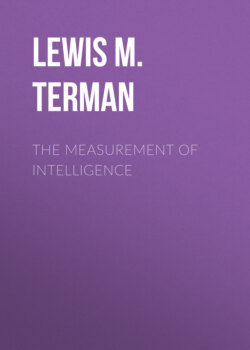Читать книгу The Measurement of Intelligence - Lewis M. Terman - Страница 13
На сайте Литреса книга снята с продажи.
Other uses of intelligence tests.
ОглавлениеTable of Contents
Another important use of intelligence tests is in the study of the factors which influence mental development. It is desirable that we should be able to guard the child against influences which affect mental development unfavorably; but as long as these influences have not been sifted, weighed, and measured, we have nothing but conjecture on which to base our efforts in this direction.
When we search the literature of child hygiene for reliable evidence as to the injurious effects upon mental ability of malnutrition, decayed teeth, obstructed breathing, reduced sleep, bad ventilation, insufficient exercise, etc., we are met by endless assertion painfully unsupported by demonstrated fact. We have, indeed, very little exact knowledge regarding the mental effects of any of the factors just mentioned. When standardized mental tests have come into more general use, such influences will be easy to detect wherever they are really present.
Again, the most important question of heredity is that regarding the inheritance of intelligence; but this is a problem which cannot be attacked at all without some accurate means of identifying the thing which is the object of study. Without the use of scales for measuring intelligence we can give no better answer as to the essential difference between a genius and a fool than is to be found in legend and fiction.
Applying this to school children, it means that without such tests we cannot know to what extent a child’s mental performances are determined by environment and to what extent by heredity. Is the place of the so-called lower classes in the social and industrial scale the result of their inferior native endowment, or is their apparent inferiority merely a result of their inferior home and school training? Is genius more common among children of the educated classes than among the children of the ignorant and poor? Are the inferior races really inferior, or are they merely unfortunate in their lack of opportunity to learn?
Only intelligence tests can answer these questions and grade the raw material with which education works. Without them we can never distinguish the results of our educational efforts with a given child from the influence of the child’s original endowment. Such tests would have told us, for example, whether the much-discussed “wonder children,” such as the Sidis and Wiener boys and the Stoner girl, owe their precocious intellectual prowess to superior training (as their parents believe) or to superior native ability. The supposed effects upon mental development of new methods of mind training, which are exploited so confidently from time to time (e.g., the Montessori method and the various systems of sensory and motor training for the feeble-minded), will have to be checked up by the same kind of scientific measurement.
In all these fields intelligence tests are certain to play an ever-increasing rôle. With the exception of moral character there is nothing as significant for a child’s future as his grade of intelligence. Even health itself is likely to have less influence in determining success in life. Although strength and swiftness have always had great survival value among the lower animals, these characteristics have long since lost their supremacy in man’s struggle for existence. For us the rule of brawn has been broken, and intelligence has become the decisive factor in success. Schools, railroads, factories, and the largest commercial concerns may be successfully managed by persons who are physically weak or even sickly. One who has intelligence constantly measures opportunities against his own strength or weakness and adjusts himself to conditions by following those leads which promise most toward the realization of his individual possibilities.
All classes of intellects, the weakest as well as the strongest, will profit by the application of their talents to tasks which are consonant with their ability. When we have learned the lessons which intelligence tests have to teach, we shall no longer blame mentally defective workmen for their industrial inefficiency, punish weak-minded children because of their inability to learn, or imprison and hang mentally defective criminals because they lacked the intelligence to appreciate the ordinary codes of social conduct.
